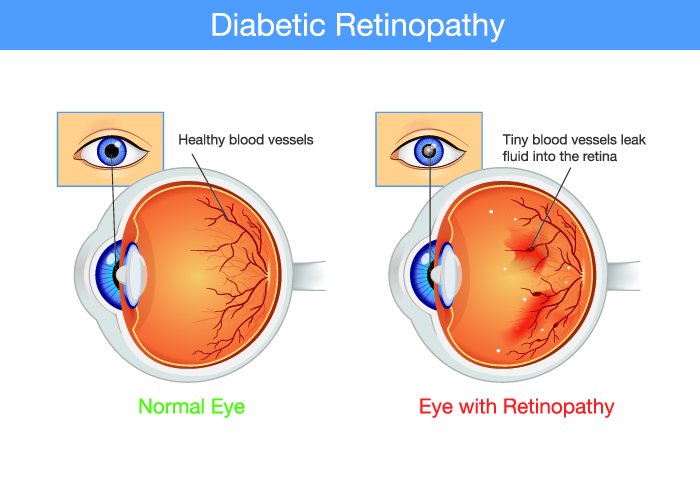Diabetic Retinopathy Treatment in Koramangala, Bangalore
Introduction -
Diabetic retinopathy is perhaps the most widely recognized eye disease found in individuals with diabetes. Diabetic retinopathy is caused because the veins in the retinas of people with diabetes are damaged. All diabetic people can suffer from this condition, and if not treated on time, it can result in complete blindness.

Types of Diabetic Retinopathy -
Diabetic retinopathy is basically of three types:-
- Background Retinopathy - Background retinopathy is also known as simple or standard retinopathy. In this type of retinopathy, the walls of the blood vessels get slightly swollen. This slight swelling forms small patches on the retina, often followed by yellow patches on the blood vessels.
- Diabetic Maculopathy - Macula is the most important part of the retina, solely responsible for your central vision. In diabetic maculopathy, background retinopathy takes place in the macula of the retina. This new development can cause difficulty reading and seeing things in your central vision.
- Proliferative Retinopathy - Proliferative retinopathy is the advanced version of diabetic maculopathy. In this type of retinopathy, your retina gets blocked, resulting in the growth of abnormal blood tissues. These blood vessels can bleed in your eyes and cause serious damage to your retina.
Causes of Diabetic Retinopathy -
Some causes of diabetic retinopathy are:
- One of the major causes of diabetic retinopathy is increased blood sugar levels for a long time. Due to excessive blood sugar, the blood vessels that transfer blood to the retina of your eye get damaged.
- Another cause can be high blood pressure.
- Diabetic people are more susceptible to diabetic retinopathy. You should make an appointment with the best diabetic retinopathy specialist near you.
Symptoms of Diabetic Retinopathy -
Not many symptoms are seen during the early stages of diabetic retinopathy. These symptoms do not appear unless some major damage is already done and the condition has worsened.
As time progresses, some symptoms start emerging, and these can be:
- You experience blind or dark spots beginning to float in your vision.
- Your vision becomes blurred or fuzzy.
- You face difficulty distinguishing between different colors.
- You face difficulty seeing at night.
- You experience severe pain in your eyes.
When To See A Doctor
If you notice mild symptoms of diabetic retinopathy, you should immediately schedule your appointment with healthcare professionals at the earliest.
Request an appointment at Apollo Hospitals
Call 1860 500 2244 to book an appointment
Risk Factors of Diabetic Retinopathy -
Some major risk factors of diabetic retinopathy are mentioned below:
- Prolonged diabetes and high blood pressure
- High and uncontrollable amount of sugar in your blood
Diagnosis of Diabetic Retinopathy -
To diagnose diabetic retinopathy, doctors generally perform a dilated eye exam by putting eye drops in your eyes. The dilated eye test allows the doctor to examine your eyes and look for:
- Abnormalities in blood vessels.
- Swelling.
- The doctor will examine if the blood vessels are leaking.
- He will examine if there is any blockage in the blood vessels.
- He will look for any damaged nerve tissue or retinal detachment.
Treatment of Diabetic Retinopathy -
The treatment of diabetic retinopathy usually depends on the type of retinopathy a person has:
- If a person is suffering from background retinopathy, there is no particular treatment for this condition. But the patient must visit the best diabetic retinopathy specialists near them frequently.
- For a person suffering from maculopathy, laser treatment is available, which prevents the production of new blood vessels and improves the supply of oxygen to the retina. This is generally harmless, but it can affect driving at night and the patient’s peripheral vision.
- These laser procedures do not improve your vision but help prevent further deterioration of your retina.
CONCLUSION -
As seen in the article above, diabetic retinopathy is basically an eye disease that develops in diabetic people. So to prevent this disease, we need to control the level of sugar in our blood. Consuming less sugar in the prime years of your life will help you prevent diabetic retinopathy in your old age.
The basic and most important method to prevent diabetic retinopathy is to keep strict control of your blood sugar level and blood pressure. Retinopathy is more common in diabetic patients with excessive sugar levels in their blood.
No, diabetic retinopathy is not entirely curable. But if diagnosed early, we can slow its progression and help save the remaining vision. The vision already lost is not reversible.
Diabetic retinopathy usually affects both eyes. You may experience symptoms only in one eye, but the other is also affected, if not equally.
Symptoms
Our Doctors
DR. SHALINI SHETTY
MBBS, MS (Ophthalmol...
| Experience | : | 30 Yeras Experience |
|---|---|---|
| Speciality | : | Ophthalmology... | Location | : | Koramangala |
| Timings | : | Available by prior a... |
Our Top Specialities
NOTICE BOARD
CONTACT US
CONTACT US
 Book Appointment
Book Appointment



.svg)
.svg)
.svg)
.svg)








